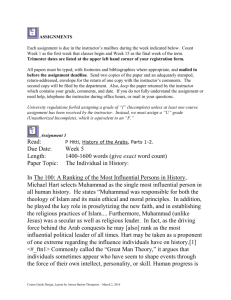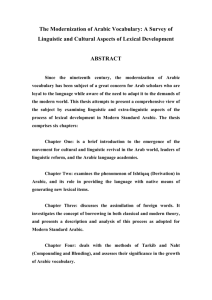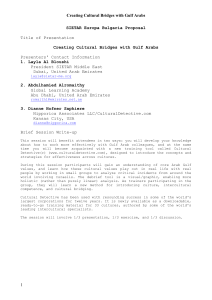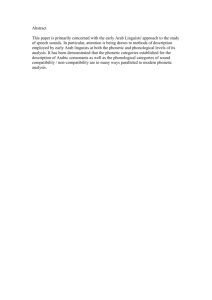Arabic Culture Syllabus-Spring 2014 Time
advertisement
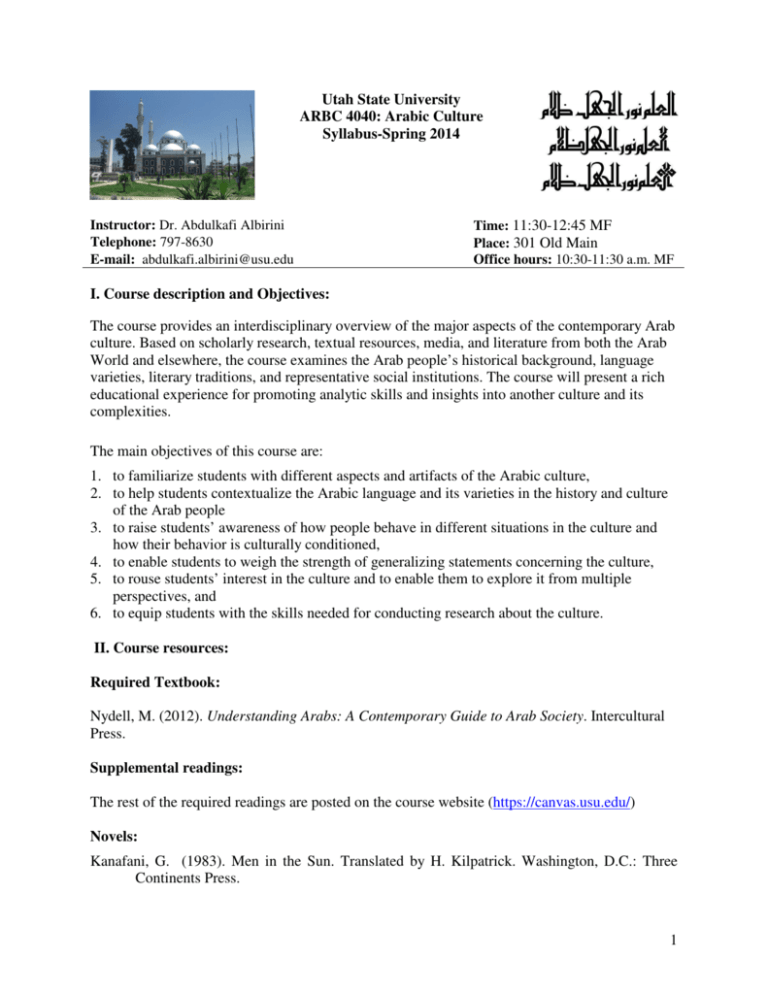
Utah State University ARBC 4040: Arabic Culture Syllabus-Spring 2014 Instructor: Dr. Abdulkafi Albirini Telephone: 797-8630 E-mail: abdulkafi.albirini@usu.edu Time: 11:30-12:45 MF Place: 301 Old Main Office hours: 10:30-11:30 a.m. MF I. Course description and Objectives: The course provides an interdisciplinary overview of the major aspects of the contemporary Arab culture. Based on scholarly research, textual resources, media, and literature from both the Arab World and elsewhere, the course examines the Arab people’s historical background, language varieties, literary traditions, and representative social institutions. The course will present a rich educational experience for promoting analytic skills and insights into another culture and its complexities. The main objectives of this course are: 1. to familiarize students with different aspects and artifacts of the Arabic culture, 2. to help students contextualize the Arabic language and its varieties in the history and culture of the Arab people 3. to raise students’ awareness of how people behave in different situations in the culture and how their behavior is culturally conditioned, 4. to enable students to weigh the strength of generalizing statements concerning the culture, 5. to rouse students’ interest in the culture and to enable them to explore it from multiple perspectives, and 6. to equip students with the skills needed for conducting research about the culture. II. Course resources: Required Textbook: Nydell, M. (2012). Understanding Arabs: A Contemporary Guide to Arab Society. Intercultural Press. Supplemental readings: The rest of the required readings are posted on the course website (https://canvas.usu.edu/) Novels: Kanafani, G. (1983). Men in the Sun. Translated by H. Kilpatrick. Washington, D.C.: Three Continents Press. 1 Class Notes: Students can access the lecture notes on the course website. The slides are organized by weekly theme. The slides will be posted on the website immediately after we finish the theme of each week. III. Student Responsibilities & Major Assignments: The six major requirements of the course include: • Classroom participation and attendance (10% of final grade): Students enrolled in this course are expected to come prepared to class. Preparation includes reading the assigned materials, bringing questions to be asked in class, and being ready to lead a discussion regarding the theme of the week. According to the attendance policy of this course, students are allowed two undocumented absences per semester. However, after the second absence, one percentage point will be deducted from their attendance grade for every undocumented absence. Your attendance grade is the percentage of the remaining classes that you have attended. Regardless of whether or not you tell the instructor that you will be absent, your absence will not be excused except under extreme circumstances. If you have any documentation of such circumstances, please submit them to the instructor on the last day of classes (25 April). • Short Essays (20% of overall grade): Students will be asked to write four short essays (2 double-spaced pages each) that involve researching or critically responding to particular issues related to the Arab culture and people. The essays will be graded based on their content as well as form. Good assignments should provide accurate information and welljustified ideas. In addition, they should be grammatically accurate and present ideas in a logical and coherent manner. Each of the essays is worth 5 points of the overall grade. • Interview (10% of final grade): for this assignment, students need to find someone who identifies himself/herself as an Arab and is willing to talk to you for at least fifteen minutes. Your interlocutor may be a student at USU, an acquaintance, etc. You will use a pseudonym for your interlocutor to reduce any possible concerns about privacy. Chat with your interlocutor for at least fifteen minutes. Do not record your conversation. Instead, try to write brief notes during the conversation (in which case you need to take permission from the interlocutor before the conversation starts) or try to jot down the main ideas immediately after the conversation. In the conversation, try to ask the interlocutor about one area in his/her cultural, moral, spiritual, or occupational life or a cultural practice about which you would like to know more. You need to report your “findings” in a three-page essay. You also need to turn in the sheet on which you wrote your rough conversation notes (whether this is done during or after the conversation). The report of your interview is due on 7 March. • In-class Presentation (10% of the overall grade): for this assignment, you will develop a 15but-no-less-than-10-minute presentation to the class about one aspect of the Arab culture or people. The content of the presentation can be research- or experience-based (or both). Please 2 do not replicate the readings or the lecture notes. It is highly recommended to use PowerPoint and to include images, video, or other illustrations in your presentation. If you do not use PowerPoint, please prepare enough handouts for the whole class. On 10 January, I will pass a sign-up sheet with the topics specified. Please be prepared to answer questions that students might ask in class about your presentation. The presentations will be evaluated based on their (1) content and informational relevance, (2) structure and coherence, (3) format and delivery, and (4) length (presentations shorter than 10 minutes will be penalized 1.5 points per missing minute). • Two Quizzes (20% of the overall grade): The students will take two 30-minute quizzes, each requiring short answers to ten questions about a number of topics discussed in the class or in the textbook. The dates of the quizzes are 28 February and 18 April. • Final Paper (30% of the overall grade): Final Paper (30% of final grade): for this assignment, you will write a 10-12 page doubled-spaced paper about one aspect of the Arabic culture, but the topic must be approved by the instructor in advance. A brief (100 words) abstract of the paper will be due on 4 April. I will return these abstracts with comments and my approval (or suggestions for modifications) within the same week. Students will prepare a 5-minute presentation of their papers to be made on 25 April. In the presentation, you need to tell us about your topic, approach, main arguments, and conclusions/findings. The paper will be due in class on Friday, 25 April. Assignments will be graded based on their content, form, and length. Good assignments should be grammatically accurate, present ideas in a logical and coherent manner, follow an ‘official’ citation form (e.g., APA), and abide by the 10-12 page length. The breakdown of the Final Paper's grade is: Abstract (3 points), Presentation (2 points), Full Paper (25 points). Assignment Policy: • All assignments should be typed • All assignments are due in hard copy only. Please do not send assignments by email. • If your assignment is between 1 and 24 hours late, you will be penalized 20% of the assigned points. After one day of the due date, the assignment will be considered missing and zero points will be the official grade. • Plagiarism is highly discouraged. Students are expected to acknowledge source materials. Please let me know if you have any questions about this issue. IV. Schedule: Dates and Topics Week 1 (6 & 10 Jan) Introduction to culture - course overview - what is culture? - key cultural concepts Week 2 (13 & 17 Jan) Readings Assignments/Events - Introduction - TB: The Arab countries, similarities and differences (pp. 145-149, 169, 189) Friday, 10 Jan., choose a presentation topic 3 Origin of the Arabs - early Arab civilizations - Arabs before Islam - Arabs after Islam Week 3 (X & 24 Jan) The Arabic Language - Classical Arabic - Arabic dialects - Arabic language, culture, and politics Week 4 (27 & 31 Jan) Religion - brief history - three major religions - religion and culture/politics Week 5 (3 & 7 Feb) Family Structure - marriage - men and women - intra-family relations Week 6 (10 & 14 Feb) Social relations - friendship - interpersonal communication - dealing with strangers Week 7 (X & 21 Feb) Social phenomenon - social etiquette - rights and obligations - the veil Week 8 (24 & 28 Feb) Art - music - artwork & clothing - architecture Week 9 (3 & 7 March) Literature - novels - short stories - prose and cultural themes Week 10 (10 & 14 March) Week 11 (17 & 21 March) Literature - classical poetry - modern poetry - poetry and culture - Hitti, P. (1996). The Arabs: a short history. Washington, D.C.: Regnery Publishing, Inc., (pp. 1-29). - Hourani, A. (1991). A History of the Arab peoples. New York: MJF Books. (pp.7-14) - TB: The Arabic language (213-222) Friday, 24 Jan Essay #1 due - TB: Beliefs and Values (pp. 1-4) - TB: Religion and Society (pp. 73-84) - Esposito, J. L. (1998). Islam: the straight path. Oxford University Press. (pp. 1-31) - TB: The social structure (pp. 59-61) - TB: The role of the family (pp. 63-70) - TB: Men and women (pp. 33-46) Friday, 7 Feb Essay #2 due - TB: Friends and strangers (pp. 5-14) - TB: Getting personal (pp. 23-28) - TB: Communicating with Arabs (pp. 87-97) - TB: Social formalities and etiquette (pp. 47- 55) - Fernea, E. W. (2002). The veiled Revolution. In D.L. Bowen & E.A. Early, Everyday life in the Muslim Middle East. Indiana University Press. (pp. 151-154). - El-Ouadie, S. (2002). Al-Aris (the Bridegroom): Prison literature and human rights. In D.L. Bowen & E.A. Early, Everyday life in the Muslim Middle East. Indiana University Press. (pp. 360-365). Friday, 21 Feb Essay #3 due - Shannon, J. (2008). Emotion, Performance, and Temporality in Arab Music: Reflections on Tarab. Cultural Anthropology, 8(1), 72-98. - Behrens-Abouseif, D. (1999). Beauty in Arabic culture. Princeton University Press (pp. 1-8). Friday, 28 February Quiz 1 - Kanafani, G. (1983). Men in the Sun. Translated by H. Kilpatrick. Washington, D.C.: Three Continents Press. - Mahfouz. N. (1985). Hanzel and the Policeman. Translated by A. Kararah. In M. Manzalaoui (Ed.) Arabic Short Stories. The American University in Cairo Press. (pp. 129-136). Spring break (no classes) Friday, 7 March Interview report due - Abu Madi, I (1987). The Human Clay. Translated by I. Boullata and N.S. Nye. In S. Jayyusi, (Ed), Modern Arabic Poetry: an Anthropology. New York: Columbia University Press. (pp. 45-47). - Darwish, M. (1987). Bread. Translated by L. Jayyusi and 4 C. Middleton. In S. Jayyusi, (Ed), Modern Arabic Poetry: an Anthropology. New York: Columbia University Press. (pp. 202-04). Week 12 (24 & 28 March) Media - press - internet - interplay of media, culture and politics Week 13 (31 March & 4 April) Media - film - drama - soap opera Week 14 (7 & 11 April) View of the “Other” - first contacts - colonialism - anti-Americanism Week 15 (14 & 18 April) Arabs in the West - immigration - socioeconomic conditions - advantages and challenges Week 16 (21 & 25 April) Patterns of Change - socioeconomic changes - globalization - students’ presentations - Gher, L. & Amin, H. 1999. “New and old media access and ownership in the Arab World”. Gazette, vol. 61, no. 1, pp. 59–88. Friday, 28 March Essay #4 due - Shafik, V. (1998). Arab cinema: History and cultural identity. Cairo: American University Press. (pp. 164-182). - Movie: Le grand voyage Friday, 4 April 100-words abstract of Final Paper due - TB: Anti-Americanism (pp. 111-125) - Movie: Driving an Arab Street. - TB: Arabs and Muslims in the West (pp. 127-142) - Shaheen, J.G. (2001). Reel bad Arabs. Olive Branch Press. (pp. 1-38) Friday, 18 April Quiz 2 - TB: Preface & Patterns of change (pp. xxiii-xxxviii) - The Arab Spring Friday, 25 April (in class) Final Paper due V. Assessment: The students’ final grade will be the culmination of their grades on all class requirements. The students’ final grade will be calculated as follows: Attendance and participation Short Essays (5 * 4 essays) In-class presentation Interview Quizzes (10 * 2 quizzes) Final paper (3 points for abstract, 2 for presentation, 25 for paper) Total 10% 20% 10% 10% 20% 30% 100% VI. Grading: This course will be graded based on the following scale: A= 93-100 % B= 83-86% A-= 90-92% B-= 80-82% B+= 87-89% C+= 77-79% 5 C= 73-76% D= 63-66% C-= 70-72% D-= 60-62% D+= 67-69% F= below 60 VII. Important Dates: Mon, 6 Jan Mon, 20 Jan Mon, 17 Feb Mon-Fri, 10-14 March Fri, 25 April Fri, 25 April Beginning of instruction Martin Luther King, Jr. day (no class) President’s day (no class) Spring break (no class) Last day of instruction Final Paper due in class (11:20 am -12:45 pm) VIII. Academic Integrity, “The Honor System” (http://www.usu.edu/provost/faculty/teaching/syllabus_resources.cfm) Each student has the right and duty to pursue his or her academic experience free of dishonesty. The Honor System is designed to establish the higher level of conduct expected and required of all Utah State University students. The Honor Pledge: To enhance the learning environment at Utah State University and to develop student academic integrity, each student agrees to the following Honor Pledge: "I pledge, on my honor, to conduct myself with the foremost level of academic integrity." A student who lives by the Honor Pledge is a student who does more than not cheat, falsify, or plagiarize. A student who lives by the Honor Pledge: • Espouses academic integrity as an underlying and essential principle of the Utah State University community; • Understands that each act of academic dishonesty devalues every degree that is awarded by this institution; and • Is a welcomed and valued member of Utah State University IX. Disability Services: (http://www.usu.edu/provost/faculty/teaching/syllabus_resources.cfm) The Americans with Disabilities Act states: "Reasonable accommodation will be provided for all persons with disabilities in order to ensure equal participation within the program. If a student has a disability that will likely require some accommodation by the instructor, the student must contact the instructor and document the disability through the Disability Resource Center (7972444), preferably during the first week of the course. Any request for special consideration relating to attendance, pedagogy, taking of examinations, etc., must be discussed with and approved by the instructor..." 6
